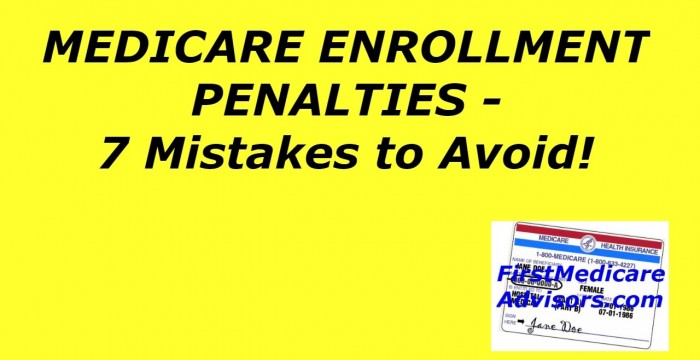For FREE help finding a Medicare plan,
Click here or call 1-800-729-9590.
FirstMedicareAdvisors.com – – Recorded Hotline: 1-800-958-8171 – Office: 1-800-825-2919. – – No Sales Pitches Ever! We hate'em as much as you do! You get the information necessary for you to decide about this important facet of your life.
These enrollment mistakes can stick with you forever.
If you aren't careful about the timing of your Medicare enrollment, you could make a very costly mistake — one that will cost you for the rest of your life.
Here's a key phrase to keep in mind: Full Retirement Age. The "full retirement age" for Social Security is now well past age 66. But, the first decision date for Medicare is at age 65 – and that’s even if you are still working and covered by your employer.
If you are already receiving Social Security at age 65 you will be enrolled in Medicare automatically. Conversely, if you’re not receiving Social Security at age 65 you must sign up for Medicare.
However, as you determine what you need to do: Pay attention to Medicare at age 65. Do your research. What is true for one person most likely won't work for you.
When you sign up for Social Security at any point after reaching age 65, enrollment in Medicare Part A — think hospital insurance coverage — is required. That includes even if you are still working and have coverage from your employer. But – the real problems revolve around Medicare Part B. Part B covers outpatient services, such as your doctor visits, x-rays, lab work, etc.
Here are some thoughts if you plan to work past age 65 – and you are not yet taking Social Security. First, you need to determine if you need to sign up for Medicare parts A and B, or not.
The mandatory signup is one of the most confusing aspects of the Medicare law. You must sign up for Medicare Part A when you start receiving Social Security benefits after age 65. There is no premium to be paid. So, you might as well sign up. Pay attention here, because it can get a little confusing.
#1 If you are still working and covered by your employer's health plan and not receiving Social Security benefits.
#2 — if your spouse is still working and you are covered under his/her group health plan — you are faced with a decision about signing up for Part B, for which you will pay monthly. That monthly premium will depend on your income level. Because there are several different income brackets give us a call and we will tell you the monthly part B premium.
#3 — Can you skip Part B? Sure but it depends on your current insurance coverage. So be careful here! Here’s why?
#4 — Large group plans cannot kick you out of your company plan when you reach age 65. If you lose or quit your job after that point, there is a special enrollment period for Medicare Part B. Your enrollment period begins when you lose or quit your job. So, you don't have to enroll in Part B if you have this large group coverage.
#5 — Now, here is an important exception: If your employer has fewer than 20 employees they can and most likely exclude individuals reaching age 65 from their group plans. Even if you can stay on the company plan, you must enroll in Medicare Part A and B at age 65. Why – because Medicare becomes your primary coverage. Your company plan now becomes your secondary coverage.
#6 — If you don't enroll – and then lose your job – or if your company drops its plan – you must wait until the following January to enroll in Medicare. Then your coverage starts the following July 1st. You should probably get a short-term health policy if you can qualify. You could be without health coverage for as much as 18 months.
#7 – Get a Medicare supplement plan when you enroll in Part B. It's important to realize that if you sign up for a Medicare supplement within six months of enrolling in Part B, you cannot be turned down for the best supplement policies for health reasons. So, when you do sign up for Part B, pick your supplement at the same time.
Is it complex? Yes, a little! But penalties for late or incorrect signups can add up to lifelong monthly penalties on your Medicare Part B premiums. Medicare mistakes can cost you hundreds if not thousands of dollars every year. It could also leave you with no coverage for a long period if you miss certain deadlines.
If you are now age 64 and turning age 65 soon we can help you learn more about these issues and help guide you in the Medicare process. Medicare mistakes can be expensive.
https://www.youtube.com/watch?v=uNbZmFgVsm0






